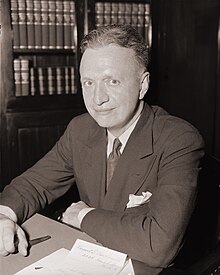Francis E. Walter
Francis E. Walter | |
|---|---|
 Walter as a congressman in 1939 | |
| Member of the U.S. House of Representatives from Pennsylvania | |
| In office March 4, 1933 – May 31, 1963 | |
| Preceded by | J. Banks Kurtz |
| Succeeded by | Fred B. Rooney |
| Constituency | 21st district (1933–1945) 20th district (1945–1953) 15th district (1953–1963) |
| Personal details | |
| Born | May 26, 1894 Easton, Pennsylvania, U.S. |
| Died | May 31, 1963 (aged 69) Washington, D.C., U.S. |
| Resting place | Arlington National Cemetery |
| Political party | Democratic |
| Military service | |
| Branch/service | United States Navy |
Francis Eugene Walter (May 26, 1894 – May 31, 1963) was a Democratic member of the U.S. House of Representatives from Pennsylvania. He was a member of the House Un-American Activities Committee from 1951 to 1963, serving as chair of that committee for the last nine of those years. He wanted to minimize immigration and was largely responsible for the McCarran–Walter Act of 1952, which kept the old quotas but also opened up many new opportunities for legal immigration to the United States.
Background
Francis E. Walter was born in Easton, Pennsylvania. He attended Lehigh University, George Washington University and Georgetown University.
Career
During both World Wars I and II, Walter was in the air service of the United States Navy. He was the director of the Broad Street Trust Company in Philadelphia, Pennsylvania, and of the Easton National Bank in Easton. From 1928 to 1933 he was the Solicitor of Northampton County, Pennsylvania. He was a delegate to the 1928 Democratic National Convention. He was elected as a Democrat to the 73rd United States Congress and served until his death in Washington, D.C. In 1947–8, he served on the Herter Committee.[1]
Walter is best known for the McCarran-Walter Act, passed over President Truman's veto in 1952, which, while it opened naturalization to Asian immigrants for the first time, continued the immigration quota system based on national origin introduced in 1924, and allowed the U.S. government to deport and/or bar from re-entry those identified as subversives, particularly members and former members of the Communist Party. In 1944, he presented President Roosevelt with a letter opener made of an arm bone of a fallen Japanese soldier.[2]
Walter's views were regarded by some as "reactionary and racist".[3] A staunch anti-Communist, he served as chairman of the House Un-American Activities Committee during the 84th through 88th Congresses. Walter also served as a director of the Pioneer Fund, a foundation best known for its advocacy of IQ variation among races.
Walter appeared in a central role in the 1960s-era U.S. government anti-Communist propaganda film Operation Abolition.[4][5][6][7] Historical footage of Walter also appears in the 1990 documentary film Berkeley in the Sixties.
Death
Walter died in 1963, aged 69, from leukemia and was interred at Arlington National Cemetery.[8]
See also
- List of United States Congress members who died in office (1950–99)
- List of members of the House Un-American Activities Committee
Footnotes
- ^ "Final Report on Foreign Aid of the House Select Committee on Foreign Aid" (PDF). Marshall Foundation. May 1, 1948. Retrieved May 30, 2020.
- ^ James J. Weingartner, "Trophies of War", Pacific Historical Review, 61, 1 (1992), pp. 54-67, 60-61.
- ^ Roger Daniels, Guarding the Golden Door: American Immigration Policy and Immigrants since 1882 (Boston & New York: Hill and Wang, 2004), p. 129.
- ^ "Operation Abolition," 1960 on YouTube
- ^ "Operation Abolition", Time magazine, 1961.
- ^ Operation Abolition (1960) on YouTube
- ^ "Operation Abolition", video.google.com and Time magazine, Friday, Mar. 17, 1961.
- ^ Rep. Francis Walter of Pennsylvania Dies; Somerset Daily American; Somerset, Pennsylvania; Page 1; June 1, 1963
Further reading
- Dimmitt, Marius Albert, Sr. The Enactment of the McCarran-Walter Act of 1952. Ph.D. dissertation, University of Kansas, 1970
External links
- United States Congress. "Francis E. Walter (id: W000108)". Biographical Directory of the United States Congress. Retrieved on 2009-02-21
- The Political Graveyard
- Letters to Francis E. Walter. Available online through Lehigh University's I Remain: A Digital Archive of Letters, Manuscripts, and Ephemera.